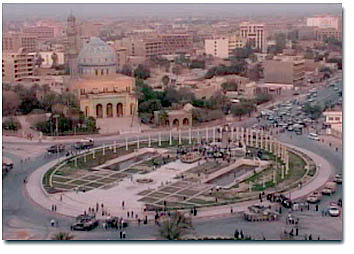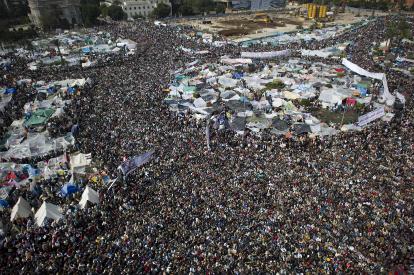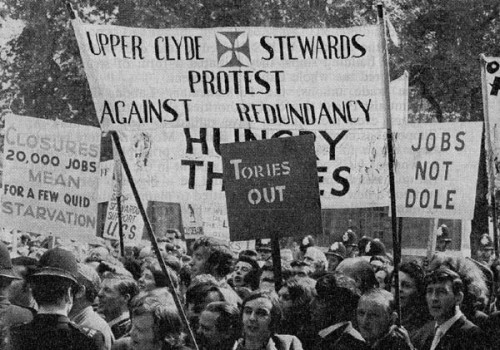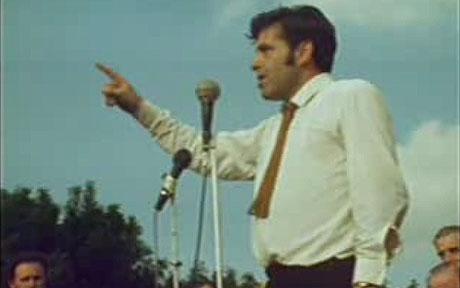Loads going on since I last posted anything. Been part of some great local protest movements as communities battle against the cuts, and been helping out as best I can. Over the months there have been mass meetings, strikes, marches, peoples assemblies, occupations and sit-ins. And all the time, people want to discuss ideas about the world, and are interested in learning about history and politics of social movements. So we find ourselves discussing new questions every week – in meetings, on facebook, in the pub or where-ever. Important questions emerge – such as one about the relationship between trades unionism and other community struggles against the cuts, or how social movements should relate to green and labour parties, and whether or how councillors can become allies in our struggles.
So I have been having important political arguments – but within my community and its campaigns – rather than as abstract political theorising ‘to the world in general’ on a blog. But at the same time, just as the capitalist system is going into crisis, so are the organisations of its socialist opponents. For example, the UKs SWP is currently in a protracted crisis. I have been commenting on these questions of left strategy and organisation on other blogs and forums, but hope to bring some of these arguments and ideas on this blog – where they may take a more structured form. Again, that is if I find time, what with life and all.
Filed under Uncategorized
Service resumed – back to blogging.
Hi all. After a long break I have resumed blogging, with three posts below that have been accumulating this year. First there is a comment on the Egyptian revolution, comparing the successful overthrow of Mubarak with the disastrous western intervention in Iraq (A tale of two Squares). Then there is a brief restatement of the history of the political philosophy of liberation from below, drawing on the history of the international workers movement (No Saviour from on High Delivers). Finally, these themes are brought together in a commentary ‘On the Libyan Tragedy’.
I have also updated a backlog of comments that had accumulated – both supportive and critical of the positions taken here – so let the debates resume!
The break from blogging since October signified something else – a return to ‘real life’ activism on my behalf. For it was in October that the anti-cuts movement took off in the UK. Since then I have been busy helping to organise local protests and meetings in my town – often hundreds strong – to defend public services. Time will tell if I can maintain both commentary and activism – and my day job – and my normal life!
Filed under Uncategorized
Some Thoughts on the Libyan Tragedy.
The art of revolution entails two things – uniting the masses and dividing the ruling elites. This appears to have been behind the success in Egypt, where the army top brass calculated that its interests would best be served by abandoning Mubarak, given the threat that ordinary soldiers would side with the people on the streets. The urban masses of Cairo – one of the great cities of the world – had overcome religious and other divisions and suddenly stood millions strong. In Libya, the opposite has now happened.
The revolution that began a month ago on Feb 17th also had initial success. Not only did the youth lead the seizure of cities from Benghazi to the outskirts of Tripoli, but the revolt also began to split the regime, with sections of it coming over to the revolution – including state and military figures. By the end of February Gaddafi looked isolated and ready to fall.
But Libya is different from Egypt in two ways – firstly it has OIL fields and secondly its tribal divisions are deeper. So Gaddafi had always been able to use the oil wealth to buy support from sections of the masses and play off one tribe against another – a long game of divide and rule. This oil means another thing – the Western imperial powers will want to use any opportunity to assert their power to protect their substantial interests in Libya’s oil fields.
At the end of February we saw a change of tone from the western political leaderships. While they had been lukewarm about the Egyptian revolution, praising Mubarak as an ally and scaremongering that the revolution was really an ‘Islamicist takeover’, suddenly they found a new stridency over Libya. It was then that David Cameron began calling for the overthrow of Gaddafi, for a no-fly zone, for arming the rebels – and the SAS made their abortive intervention in Benghazi. While the revolutionaries of Benghazi kicked out the SAS and hung a banner prominently denouncing western interference, the damage was done.
This was a gift for Gaddafi. He could now credibly portray the revolution as a western imperialist plot while posing as the great ‘national hero’ and ‘anti-imperialist leader’. Western threats would inevitably and rally more support behind his regime. Cameron’s sabre rattling – rather than opening up further cracks within the ruling elites, would help cement Gaddafi’s teetering rule. Ruling elites throughout history have used fears of foreign invasion – real or imagined – to suppress dissent. But in the Arab world, which has long smouldered under the heel of western colonialism, such threats of western interference are political and cultural dynamite.
The joy of the Arab Spring of 2011 was that the masses would (even if only briefly) take the centre stage of history – acting for themselves. This act of revolution promised to overcome years of indignity and oppression meted out by both Arab rulers and their imperial overlords. Bush and Blair’s adventure in Iraq has lead to such a bloody disaster because liberation can never come from above, from a foreign army. In contrast to the unity and solidarity achieved on the streets of Cairo, post invasion Iraq saw only years of civil war and sectarian strife.
Now it looks like the imperial powers will get embroiled in Libya – even given the experience of the Iraq disaster showing the bankruptcy of so called ‘humanitarian interventionism’.
Now the tyrant Gaddafi is threatening to become the butcher of Benghazi. But can the powers that levelled Fallujah in 2004 save Benghazi in 2011? In Iraq’s Fallujah, the USA and UK forces suppressed a city-wide uprising – when ‘our side’ used chemical weapons such as white phosphorous and killed thousands of civilians. The western powers are no better than the tyrant Gaddafi – and they can be worse. 100,000’s died because of Bush and Blair’s invasion.
If the west intervenes in Libya it will be to secure its assets and interests there, especially around Oil. Most probably they will partition the country, between East and West – a Balkanised Libya, leading to bitter civil war. Tyranny will be strengthened – not democracy and freedom. This is the Libyan tragedy. The people of Libya are stuck now between a rock and a hard place – between the murderous Gaddafi regime – and the imperial greed of the west.
And the stench of hypocrisy rises pungently from every utterance of Cameron. For at the other end of the Middle East, the dictatorship in Bahrain is also using bloody force to crush a democratic revolution. And the forces of repression are being backed up by the pro-western absolute monarchy of Saudi Arabia, armed by Britain. What do we do? The Queen is inviting the murderous and brutal King of Bahrain to London to the Royal Wedding! Why don’t they be even handed and invite the murderous Gaddafi as well? The palace garden party will be full of dictators, corrupt monarchs and war mongers – he will feel in good company.
Filed under Uncategorized
‘No saviour from on high delivers’
Adding to the post below about the Middle East. The long story of winning democratic rights in Britain has given us a hard won experience – from the Chartists of the 1840’s to the struggle for women’s rights to vote at the beginning of the twentieth century. Liberation can only come from below – not from above. In 1864, the First International Workers Association declared in the opening lines of its founding statement ‘That the emancipation of the working classes must be conquered by the working classes themselves’. This political reality was then widely recognised. A verse from the 19th century working class anthem the ‘internationale’ famously declares that ‘No saviour from on high delivers’. No saviour from on high – especially raining bombs down from the sky – can liberate the working people.
Filed under Uncategorized
This is what revolution looks like – a tale of two squares.
Remember the famous media event in the 2003 Invasion of Iraq? When ‘the masses’ pulled down the statue of Saddam Hussein? This was supposed to signify the ‘liberation of Iraq’ – a popular revolution. At first the media only showed us a close up. Later, long shots of the incident were published (reproduced below) which show that it was a tiny event stage managed for the world media. This helps explain why the aftermath of the invasion saw years of bloody civil war in Iraq, full of sectarian strife. There was no popular revolution from below – only a decapitation of the regime from above by an imperialist war machine.
A mass popular revolution achieves two things – not only can it bring down a tyrannical regime – but it also organises something to fill the vacuum. Civil society grows in a revolution – mass democratic organisations and associations emerge at the grassroots, able to unite the people. But none of this emerged out of the chaos of Bush and Blair’s ill advise Iraq adventure, and nor could it.
Now contrast the picture of Fardis Square, Baghdad in 2003 with pictures from Tahrir Square, Cairo in 2011. This is what a real revolution looks like – not a stage managed event – but the masses taking centre stage of history.
Lets hope this revolution – liberation from below – can bring real democracy and equality for the people of Egypt – in a way that Bush and Blair’s war machine never could for the people of Iraq.
Filed under Uncategorized
Protests against cuts grow across Britain.
Most towns and cities in Britain have just seen substantial local protests against the cuts. This week there were waves of protests either on the 20th of Oct (day of the Con-Dem governments spending review) or today – the Saturday after. And more local protests, marches and rallies are planned everywhere. The biggest so far has been todays 20,000 strong STUC march against cuts in Edinburgh. Thousands also took to the streets in Sheffield, Manchester, Cambridge, London and Bristol. Reports are coming in of good turnouts everywhere.
I attended a lively protest of around 300 people outside the Town Hall of the small northern town of Lancaster on Wednesday. This was called at short notice to launch a local campaign, ‘Lancaster and Morecambe Against the Cuts!‘ and had a fairly good turnout for a weekday evening in a small city of only 50,000 people. Lots of people seem willing to demonstrate and campaign, hand out leaflets, put up posters and email workmates and friends.
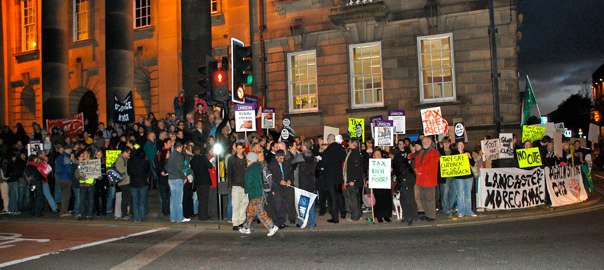
Lancaster town hall protest against cuts
Image from Lancaster and Morecambe Against the Cuts!
This feels like the build up to the big anti-poll tax uprising of 20 years ago, or the big anti-war upsurge at the beginning of 2003. And this is before the scale of the cuts have hit home – communities will see their sports centres, swimming pools, libraries and many more local facilities threatened. Such measures could spark outrage and bigger protest campaigns reaching well beyond the various organised lefts and trades unionists who make up the bulk of this current initial wave of protest.
The Scottish TUC must be congratulated for calling todays march – and bringing together protest on a national scale. Today the TUC (covering all the parts of Britain) announced a national demo for London, proclaiming it would be its ‘biggest and boldest’ protest ever. This is good – but it is scheduled for the 26th March 2011! We need a big London March in the next few weeks! And looking to France, days of coodinated strike action might work here in the current climate of anger. However, we should still promote the TUC’s March 2011 event – which really could be big if it coincides with the anger that will be generated as the cuts really bite next year.
We also need the kind of politics which can unite the whole working class and wider society – otherwise people might fight each other in a game of divide and rule as councils try to get people to choose which services are cut – swimming pool users against library users, or whatever. We need to be able to point to the billions of pounds the super-rich have been exploiting from this society over the past decade. The richest 10% now own £4,000 billion – which is nearly 50% of all private wealth in the UK. The poorest 50% of the population own just 9%. The rich have got richer at the expense of the poor. Even if we just collected the unpaid taxes of the wealthy, we could get 100 billion a year! This is without raising the taxes to the level Thatcher had them at for most of her period in office – restoring these tax levels would bring in many billions more.
In other words, we need to re-articulate a popular politics of class in Britain. But Labour’s newly elected leader has already broken his campaign promises that made Trades Unionists feel he might do this. He pledged during the recent leadership campaign that he would speak at the TUC’s westminster rally on the eve of the cuts announcement last week. This was a major way in which he differentiated himself from his brother, who flatly refused to speak at the Trades Union protest. So Ed was able to pick up large numbers of Trades unionists votes, which won him the leadership. However, this week he backed out of this commitment, and refused to address the TUC event, frightened of the media jibes of ‘Red Ed’ and desperate to appease the bankers, ruling elites and the powerful right wing inside the Labour Party.
We will need to generate a grassroots movement of protest and resistance, like we did 20 years ago with the anti-poll tax movement that broke Thatcher. This movement had no official sanction from the unions or the labour party. Grassroots local groups just did it! But its still sad that our union leaders, with 7 million members and enormous resources are not pulling their weight. We can see what would happen if they really did get off their arses and mobilise properly – we only have to look across the channel and see the mass union actions shaking France, Spain, Portugal, Greece, Italy and elsewhere.
Todays Edinburgh March.
Filed under Uncategorized
They Say Cutback – We Say Fightback! A slogan whose time has come.
Yes, its an old slogan – but as it rings through our streets once again, voicing the rage of a new generation, it has never been more relevant. Over the next few years it could become the battle cry of millions.
Great to see thousands of trades unionists and community campaigners lay siege to the Tory party conference yesterday. The footage on this well-made video shows a rich diversity of grassroots campaigners and working class movements. These included postal workers, health workers, teachers, council workers, private and public sector trades unionists, disability rights campaigners, community groups, including young and old and people of all ethnic, racial and religious groups. It was heartening to see all these united in the great common cause of our time – resistance to the public service cutbacks. Cameron and Clegg’s cut agenda aims to intensify the process of wealth redistribution from the working classes to the super-rich, making us pay for the crisis of their out of control system of finance driven capitalism.
This is just the start – protests, strikes and occupations must grow in response to the cuts that will be announced in the governments spending review on the 20th Oct.
Filed under Uncategorized
They call him ‘Calamity Clegg’ – should we enjoy watching this politician melt?
Things are not going well for Nick Clegg. Take this video news clip (posted below). It shows his disastrous photo-opp visit to a Children’s Centre in London yesterday. This video nicely illustrates at least half of his problem. The hapless Clegg was visiting the ‘Shepherd’s Bush Families Project and Children’s Centre’. His intention was to to promote his plans to ‘improve social mobility for the young’ – and also to promote his image as a caring politician, of course.
The problem was that the centre is being cut – has just lost £47,000 – and the building itself, used by 44 local groups, faces closure as the council wants to sell it off! An outraged local community is campaigning against this, of course. He was therefore filmed being confronted by angry and concerned local people including parents, children, and workers at the centre. He even face the embarrassing and politically damaging moment of being presented with cards specially made by the children begging him and his government to stop the closure! Poor old ‘Nice Nick’ is inexorably becoming reframed as ‘Nasty Nick’.
Click here for the footage:
Opportunism in Crisis
This is of course a first class political blunder. But it is part of a much wider picture. The Lib-Dems have created their electoral base by hijacking popular local community campaigns against cuts exactly like this one. In the past they could always play the nice guy, opportunistically posing as all things to all people. Now we can see the real face of economic liberalism, as this party helps bring about the deepest and most destructive cuts in generations. In their foolish and greedy impatience for high office they have hitched themselves to an unprecedentedly vicious neo-liberal ideological and economic offensive against the welfare state lead by the Tories. Over time, as people experience and sometimes resist these bitter losses, the Lib-Dem’s electoral support will be fatally eroded, and they also risk tearing themselves apart.
Everywhere Clegg now goes, he will start to melt in this political heat. He is getting incredibly bad press – risking becoming typecast as ‘Calamity Clegg’ – as everywhere he goes he faces angry former supporters. So the very next day after this disaster at the childrens centre in London, he walks into the fire in Tyneside. The BBC headline is “Cuts dominate Nick Clegg’s return to Tyneside” while the Daily Mails spin is: “Clegg loses his cool: Deputy PM silences LibDem voter during ill-tempered meet-and-greet”.
But this only makes up half of Clegg’s crisis – the half composed of angry communities resisting cuts (communities which include dissillusuioned former Lib-Dem supporters). The other half is the Tory press and the Tory establishment who will also punish Clegg for two reasons. Firstly, they don’t trust him or like his occasional divergences from Cameron (seen as disloyalties) over issues like Trident or Iraq. Secondly as the coalition government becomes ever more unpopular and even hated by large sections of the public, the Tory press will need to find and focus attention on a variety of scapegoats. One of these scapegoats will be the Lib-Dem’s and their leader, who will be the fall-guys, crucified in a vain effort to save Tory skins (and seats)!
Clegg and the Lib-Dems are particularly vulnerable precisely because of their opportunistic past – of being all things to all voters. To appeal to disillusioned Labour voters the Lib-Dems posed as a leftish alternative to Labour, opposing the previous governments appalling record of wars, repressive laws, student tuition fees and other right wing policies. But they would put out a different tone of leaflet and campaign in more prosperous Tory voting areas. This usually worked until they took over a council, started privatising services and punishing the poor, soon becoming as hated as the Tories or the worst New Labour regime. But in the past, these were merely local problems for them caused by limited and localised exposures. Now, however, they are part of central government and this trick no longer works for them – and the chickens are coming home to roost.
So to answer the question posed in the title – yes – enjoy!
In this instance schadenfreude seems not only permissible, it may even be positively de rigueur! The Lib-Dem’s are the weakest link, the vulnerable pressure point in the Cameron regime. As their electoral support evaporates, more of the party will want to leave the coalition. This is the clearest way of bringing down the Cameron government and fighting its cuts.
But also lets build a genuinely radical alternative force in politics – one that challenges the dominant agenda of big-business, the war-mongers and sycophants of the super-rich. We need a force in politics which stands for liberty, equality and solidarity and which puts people and the planet before profit. We need a social and political movement which as its first priority organises to fight these cuts – and therefore fights to prevent this ugly Tory-Lib-Dem attempt to shift the balance of wealth and power still further in favour of the rich and ever further away from the common people.
Filed under Crisis of capitalism, Uncategorized
Jimmy Reid. July 1932 – August 2010. In memory of a great victory – and an inspiration for future ones.
Video: Matt McGinn sings ‘Wi’ Jimmy Reid and Airlie’ to images from the great UCS work in.
— — —
In the late 1960’s, British shipbuilding was in trouble, blighted by under-investment in new technology. For decades shipyard owners had milked the industry as a cash cow, relying on a super-exploited workforce and 19th century conditions. In response the Labour government, including Tony Benn, developed a strategy to save the industry and modernise it. They consolidated three major shipyards on Glasgow’s Clydeside into UCS – Upper Clyde Shipbuilders, part nationalising it with a 48.4% stake in the project and a £5.5m interest free government loan over the first three years. The new UCS had a labour force of 13,000 and an order book of £87m. By the end of 1970 the UCS Chairman could report that the company was “gaining in strength and morale as each day passes”.
However, the incoming Tory government of Edward Heath announced a shocking U turn, and announced the closure of the yard, threatening Glasgow with mass unemployment and an end to centuries of British shipbuilding, an industry where Britain had been a world leader.
The Tory plan to close the yard represented the beginning of a new core Tory strategy of de-industrialising Britain, as they began to pursue an alternative capital accumulation strategy around global finance. This new Tory strategy would also have one advantage for the conservatives – it would help shatter the power of their biggest enemy – the organised working class and the trades unions.
As the Tories brought in the liquidators, in response the UCS shop-stewards sprang into action, holding mass meetings in the yards. Lead by communist shop stewards Jimmy Reid, Jimmy Airlie and Sammy Barr they agreed that instead of striking and locking themselves outside the gates, they would stay inside the yards and occupy them. Furthermore, they would carry on working and building ships, defying the Tory liquidators, who were forced to accept that the workers were in control. The shop stewards insisted on strict discipline inside the occupied yards to portray the best image. Tony Benn led the offensive in parliament, highlighting the massive increases in productivity and the full order books for future ships.
The workers occupation was able to rally the majority of society behind their fight. Mass protests of over 80, 000 people filled Glasgow to support the occupation, with 200,000 workers across the region joining solidarity strike action. Supporters from across society donated tens of thousands of pounds to help the shipyard workers cause, enabling those taking part in the work-in to continue to be paid throughout the action. The Scottish Trades Union Congress held a public inquiry that exposed the ideological nature of the Tory plan to close the yard, a plan hatched while they were in opposition, despite knowing the industry was viable. After 16 months of struggle, the Tory government gave in and agreed a settlement, giving £35 million in further subsidies for shipbuilding to continue. This represented a significant victory for the working class at the time.
This story shows what working class action could achieve, and shipbuilding continues on Clydeside to this day. Unfortunately, the British ruling class were still committed to their class war against organised labour and the de-industrialisation of Britain, sensing richer pickings through following the path of global finance capitalism. Their class war continued under Thatcher, and the key sections of the organised working class and British industry were destroyed. But the UCS occupation pointed to an alternative future, one made possible where organised workers take militant and creative action and win the leadership of the whole of society, to take it in a different direction.
Whilst we are in a different situation today, the lessons still stand. The power of organised labour can save society from the devastation of capitalist crisis, and open up a different future for us all. Young workers today must learn these lessons from their history and take inspiration, we need a new generation of the like of Jimmy Reid, as we face the battles to come, against Cameron’s attempt to destroy public services.
Filed under Uncategorized, working class self-defence
Nice one Peter! Brilliant performance exposes Griffin and the BNP!
Have you seen the footage of Peter Tatchell confronting Nasty Nick Griffin this week? I think its brilliantly done! Tatchell calmly walks up to Griffin, and then simply stands beside him and asks, in a load voice, a clear and direct question:
“Hi Nick, isn’t it about time you apologised to the British people for your party’s long history of anti-Semitism, homophobia and attacks on the Muslim community?”.
The reaction is both shocking and predictable. Tatchell is manhandled out of the way by Griffins minders, the ugly squad of BNP thugs in suits. But when Tatchell responds by pointing out how this represents typical BNP behavior, commenting in a clear voice that could be picked up by the cameras: “”This is the BNP in action. Look at them, they’re thugs” the thugs and their controllers realise the trap they are in, and retreat, allowing Tatchell to continue his questioning of Griffin.
Griffin simply flees. This shows how broken he is, along with his party. There was no flair or confidence, no attempt to offer a riposte to Tatchell, no attempt to to seize the media situation. Simple thuggery and then a cowardly retreat. Nick Griffin must be a tired and troubled man, his party in crisis, weak and without the energy to spontaneously perform for media. He is just a posh stuffed shirt only able to act in stage-managed situations, delivering pre-written lines.
Griffin crumbles before Tatchell’s calm and courageous tactics. Tatchell has not been well, suffering from past assaults on him by thugs belonging to both Mugabe’s regime and Russia’s far-right homophobes. Once again Tatchell deploys a dignified and principled nonviolence in the face of real risks from the thugs of dictators and fascists.
The fascists of the BNP and the crazed anti-Muslim bigots and racists of the EDL might face certain limitations. The far right attracts bitter and broken people, desperate to lash out, but too submissive to confront the most powerful institutions – the capitalist class – so instead they attack the relatively powerless. They victimise the scapegoats – sticking the boot in to refugees, migrant workers, ethnic minorities. The basic cadre of fascist movements like the BNP is always going to be drawn from the reservoir of sad, failing people on a desperate ego trip, all scheming against each other, driven by vanity and delusions of grandeur, while simultaneously nursing a perpetual victim mentality. The EDL are also riven by fractions, some fascist and some pro-zionist, or rival football firms and competing agendas.
But however much the fascists and the far right may crumble and fall, collapsing under their own internal contradictions and general incompetence, they will always be revived by a certain life-support system. The capitalist system is in a deep and protracted crisis. To deflect the blame away from themselves, the capitalist class need scapegoats. Therefore the capitalist owned media whips up wave after wave of campaigns against Muslims. The Daily Express appears almost as a single issue campaign against refugees, migrants and Muslims, trying to marginalise and demonise these groups still further. But all the ‘tory tabloids’ and the mutinational media empire of Murdoch, with the Sun, the Times and the News of the World play the same dirty game. The Express also showed how it was prepared to go for other targets, to use homophobia as well as islamophobia and more general racism. When it can combine racism, xenophobia and homophobia together in the same story, it responds with an especially vicious zeal, as in the recent attack on LGBT asylum seekers:

Daily Express - a homophobic, islamophobic hate sheet, an instrument of divide and rule for capitalism.
In a similar vein, the tuely rancid Daily Star wrote about this issue, going into full-on right wing bigot rant headlined “NO ROOM FOR GAYS”.
Thus capitalism, the capitalist media and pro-capitalist political parties will always stir up prejudice in a crisis, picking on the easiest target they can find from amongst the poor, the weak and the stigmatised. This provides the ideal nutrients for the fascist fungus to keep on growing. But Peter Tatchell’s actions this week showed that with courageous and bold action, fascism can always be confronted and driven back.
Filed under Fascism and Anti-fascism, Uncategorized

